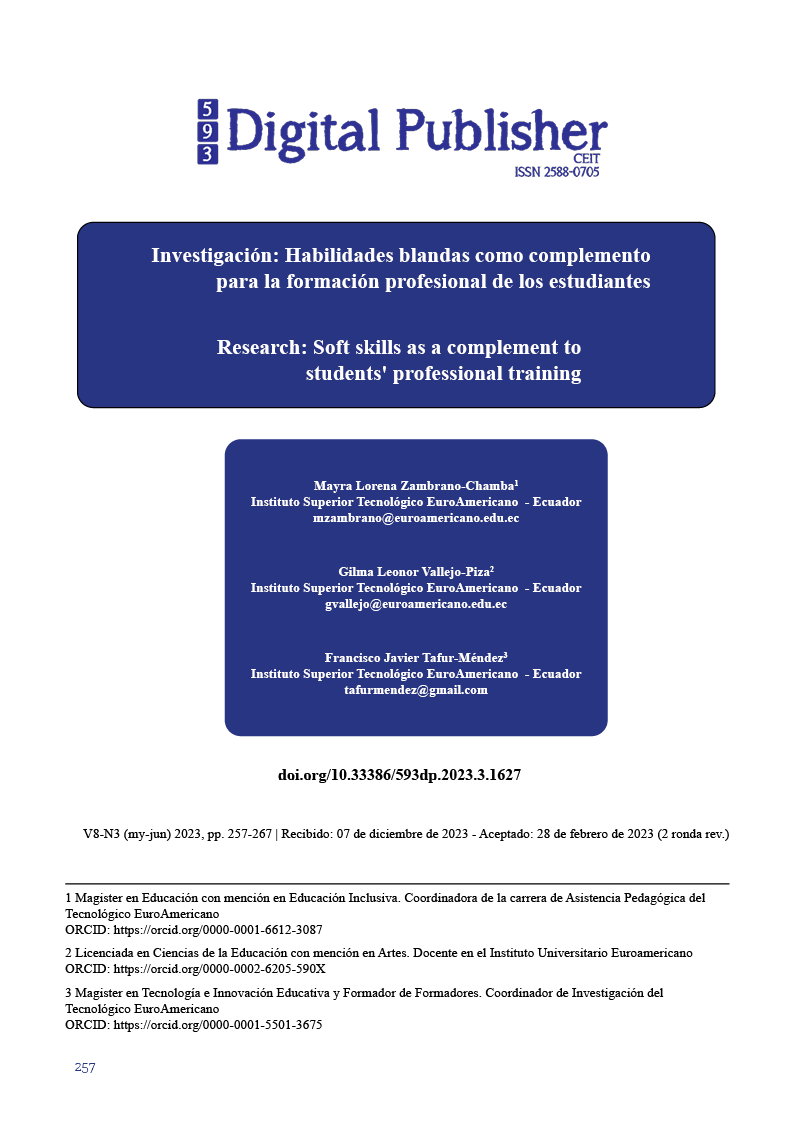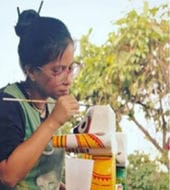Research: Soft skills as a complement to the professional training of students
Main Article Content
Abstract
This article demonstrates the importance of soft skills in the professional training of students, as well as the need to implement training for teachers in terms of soft skills, for their implementation inside and outside the classroom, thus facilitating the acquisition by students and improving not only the work environment but also important aspects such as the comprehensive development of students. It is through these skills that they will be able to face the labor competition, since they are highly demanded by employers, because they facilitate problem solving, teamwork, work ethic, among other aspects, in addition to the fact that, in the future, through these skills acquired, they will be able to provide significant contributions at a social level, as well as economic and productivity within their jobs.
Downloads
Article Details

This work is licensed under a Creative Commons Attribution-NonCommercial-ShareAlike 4.0 International License.
1. Derechos de autor
Las obras que se publican en 593 Digital Publisher CEIT están sujetas a los siguientes términos:
1.1. 593 Digital Publisher CEIT, conserva los derechos patrimoniales (copyright) de las obras publicadas, favorece y permite la reutilización de las mismas bajo la licencia Licencia Creative Commons 4.0 de Reconocimiento-NoComercial-CompartirIgual 4.0, por lo cual se pueden copiar, usar, difundir, transmitir y exponer públicamente, siempre que:
1.1.a. Se cite la autoría y fuente original de su publicación (revista, editorial, URL).
1.1.b. No se usen para fines comerciales u onerosos.
1.1.c. Se mencione la existencia y especificaciones de esta licencia de uso.
References
Adriana Mórtigo Rubio, D. R. (s.f.). Desarrollo de competencias emocionales en el aula de clase: Estrategia para la resolución de conflictos. Boletín Virtual, 7(2). https://doi.org/https://revista.redipe.org/index.php/1/article/view/432/428
Ana Marcela Cordero Clavijo, N. J. (2020). Habilidades blandas, un factor de competitividad en el perfil del servidor público. Polo del Conocimiento, 5(5), 41-63. https://doi.org/10.23857/pc.v5i5.1399
Asencio, A. D. (2018). Trabajo en equipo. Elearning S.L. https://doi.org/https://books.google.es/books?hl=es&lr=&id=GG12DwAAQBAJ&oi=fnd&pg=PA5&dq=trabajo+en+equipo&ots=4Zbv1RBRBm&sig=n3W2rlpGL1XCBUuxdDbbPQEq2wI#v=onepage&q=trabajo%20en%20equipo&f=false
Gamero, M. E. (2019). Las habilidades blandas competencias para el nuevo milenio. Dilvugare Boletín Científico de la Escuela Superior de Actopan(11). https://doi.org/https://doi.org/10.29057/esa.v6i11.3760
Humberto Coromoto Peña Rivas, S. G. (2018). Motivación Laboral. Elemento Fundamental en el Éxito Organizacional. Revista Scientific, 3(7), 177-192. https://doi.org/https://doi.org/10.29394/Scientific.issn.2542-2987.2018.3.7.9.177-192
Jenny Liliana Rodriguez Siu, R. E. (2020). Habilidades blandas y el desempeño docente en el nivel superior de la educación. Propósitos y Representaciones, 9(1). https://doi.org/http://dx.doi.org/10.20511/pyr2021.v9n1.1038
Larna, A. N. (2019). La importancia de las habilidades blandas para la docencia universitaria en el contexto actual. Pensamiento Académico de la Universidad UNIACC, 2(1). https://doi.org/doi:10.33264/rpa.201901‐07
Marcos Antonio Espinoza Mina, D. G. (2020). Habilidades blandas en la educación y la empresa: Mapeo Sistemático. Uisrael. https://doi.org/https://doi.org/10.35290/rcui.v7n2.2020.245
OdalysMarreroSánchez, R. M. (2018). HABILIDADES BLANDAS:NECESARIAS PARA LA FORMACIÓN INTEGRAL DEL ESTUDIANTE UNIVERSITARIO. ECOCIENCIA. https://doi.org/https://3.14.189.95/index.php/ecociencia/article/view/144/111
Omar Matus, A. G. (2012). Habilidades Blandas: Una ventaja competitiva en la formación tecnológica. https://www.jint.usach.cl/sites/jint/files/art._9_print_v2n1jint006-15_v3.0_0.pdf
Quispe, R. I. (2018). Repositorio Universidad Nacional San Agustín de Arequipa. http://190.119.145.154/bitstream/handle/UNSA/8512/EDMpuquri.pdf?sequence=1&isAllowed=y
Silvia Josefina Aguinaga Vásquez, S. J. (2020). Educare Comunicare. Revista Científica de la Facultad de Humanidades. https://doi.org/https://DOI 10.35383/educare.v8i2.47
Soto, e. E. (2019). Competencias docentes para la resolución de conflictos en el ámbito escolar. educere, 24(77). https://doi.org/https://www.redalyc.org/journal/356/35663240004/35663240004.pdf
Vidal, R. V. (2005). Creatividad para Profesionales. Madrid(29). https://doi.org/http://www.madrimasd.org/revista/revista29/tribuna/tribuna2.asp




